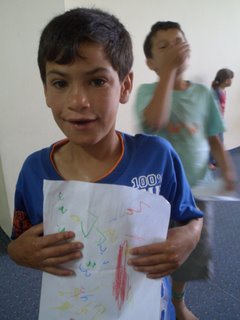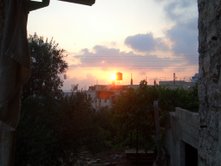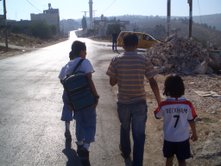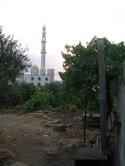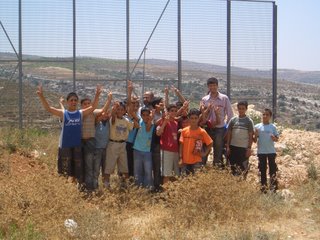The Clinic in Housan
‘Al Arqube Charitable Medical Centre’ situated in Housan, plays a vital role in serving the communities medical needs. This 24 hour medical service acts as the only clinic accessible to the community; with the nearest Hospitals in Beit Jala often, expensive and difficult to access.
Mohammed’s story:
On a Saturday morning in Housan’s clinic, Mohammed sits on his fathers lap. His father appears exhausted cradling his two year old son, who has been referred to the clinic from the near by Hospital in Beit Jala. Mahmood during his first months suffered brain damage due to a ‘medical mistake’. Now his Father unable to pay 600 shekels monthly the Hospital refuses to admit him in order for his son to receive the appropriate care he needs. The clinic cannot provide the care for Mahmood, however it plays a critical role in providing a supportive facility for such cases. The staff at the clinic attempt to network with near by hospitals so that members of the community receive the medical attention they need.
In the waiting area sits Noor, she is eleven years old; sitting with her is her brother Dahood aged ten. They came alone to the clinic, both complaining of abdominal pains, they tell me they don’t know what’s wrong with them.
Zaaki is brought in by his Grandmother Fatima; he is feverish. Fatima his grandmother says she does not know what is wrong, but hopes this visit will mean an end to her grandson’s discomfort
Out visits:
The clinic in Housan serves too as the sole medical provider to neighbouring village of Beit Fajaar, the clinic staff travel with any available medicine loaded into a taxi to provide medical attention where needed. The limited medical supplies and equipment available, make catering to the needs of the patient hugely testing. Patients from all around the village wait to meet with the clinic. Attending the clinic largely are women, often on behalf of their whole families, either for consultations with the doctor or repeat prescriptions. The severe lack of medication appropriate to the various illnesses is major concern, the lack of appropriate medication means the medical team are being forced to improvise in order to treat conditions: Adult dosage often prescribed to children, and paediatric prescriptions for adults.
Beit Fajaar has a population estimated around 18’000, with the surrounding hamlets bringing the total to approximately 25’000. The average income per household is around 450 shekels the equivalent of $90 per month. Medicines are greatly subsidised by the clinic, as many villagers of ‘Al Arqube’ area are simply be unable to afford needed medicines from any local pharmacies. The Staff at the clinic, are hugely faithful to the community they serve, however their roles are handicapped by the inability to serve patients needs due to the insufficient equipment and medicine available. Difficulty in receiving desperately needed supplies is heartbreaking for staff desperate to serve this community, and for the villagers desperately in need of basic medical treatment.
Mohammed’s story:
On a Saturday morning in Housan’s clinic, Mohammed sits on his fathers lap. His father appears exhausted cradling his two year old son, who has been referred to the clinic from the near by Hospital in Beit Jala. Mahmood during his first months suffered brain damage due to a ‘medical mistake’. Now his Father unable to pay 600 shekels monthly the Hospital refuses to admit him in order for his son to receive the appropriate care he needs. The clinic cannot provide the care for Mahmood, however it plays a critical role in providing a supportive facility for such cases. The staff at the clinic attempt to network with near by hospitals so that members of the community receive the medical attention they need.
In the waiting area sits Noor, she is eleven years old; sitting with her is her brother Dahood aged ten. They came alone to the clinic, both complaining of abdominal pains, they tell me they don’t know what’s wrong with them.
Zaaki is brought in by his Grandmother Fatima; he is feverish. Fatima his grandmother says she does not know what is wrong, but hopes this visit will mean an end to her grandson’s discomfort
Out visits:
The clinic in Housan serves too as the sole medical provider to neighbouring village of Beit Fajaar, the clinic staff travel with any available medicine loaded into a taxi to provide medical attention where needed. The limited medical supplies and equipment available, make catering to the needs of the patient hugely testing. Patients from all around the village wait to meet with the clinic. Attending the clinic largely are women, often on behalf of their whole families, either for consultations with the doctor or repeat prescriptions. The severe lack of medication appropriate to the various illnesses is major concern, the lack of appropriate medication means the medical team are being forced to improvise in order to treat conditions: Adult dosage often prescribed to children, and paediatric prescriptions for adults.
Beit Fajaar has a population estimated around 18’000, with the surrounding hamlets bringing the total to approximately 25’000. The average income per household is around 450 shekels the equivalent of $90 per month. Medicines are greatly subsidised by the clinic, as many villagers of ‘Al Arqube’ area are simply be unable to afford needed medicines from any local pharmacies. The Staff at the clinic, are hugely faithful to the community they serve, however their roles are handicapped by the inability to serve patients needs due to the insufficient equipment and medicine available. Difficulty in receiving desperately needed supplies is heartbreaking for staff desperate to serve this community, and for the villagers desperately in need of basic medical treatment.
